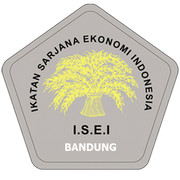The Difference between Corporate Rating Migration Probability during Economic Contraction and Expansion in Indonesia
Abstract
Corporate Rating is one of the tools of Signaling Theory, expected to provide clear and standardized signals of a company’s financial health and credit risk. However, according to the experts, the regulation of Corporate Rating issuance by Credit Rating Agency (CRA) becomes a hindrance to the timeliness of company information updates, especially during sudden large-scale economic shifts. Based on this issue, this research aims to examine the differences between Corporate Rating migration probabilities under two different economic conditions: contraction and expansion. Before conducted hypothesis testing, the secondary data from 73 sample companies were processed using Markov-Switching Autoregressive (MSVAR) and Multinomial Logistic Regression methods. Ther results of this study shows that there is no difference in the probability of a Corporate Rating downgrade during both economic conditions. On the other side, the probability of a Corporate Rating upgrade is smaller during economic contraction, and there is a difference in the probability of a Corporate Rating remained unchange between both economic conditions.
Keywords
Full Text:
PDFReferences
on Credit Risk Models, the Altman Z-Score Family of Models and Their Applications to Financial Markets and Managerial Strategies. The Journal of Credit Risk, 14(4), 1-34. https://doi.org/10.21314/JCR.2018.243
Bangia, A., Diebold, F. X., Kronimus, A., Schagen, C., & Schuermann, T. (2002). Ratings Migration and The Business Cycle, with Application to Credit Portfolio Stress Testing. Journal of Banking & Finance, 26(2–3), 445-474. https://doi.org/10.1016/S0378-4266(01)00229-1
Boreiko, D., Kaniovski, S., Kaniovski, Y., & Pflug, G. (2017). Traces of Business Cycles in Credit Rating Migrations. PLOS ONE, 12(4). https://doi.org/10.1371/journal.pone.0175911
Boreiko, D., Kaniovski, S., Kaniovski, Y., & Pflug, G. Ch. (2018). Business Cycles and Conditional Credit-Rating Migration Matrices. Quarterly Journal of Finance, 8(4). https://doi.org/10.1142/S2010139218400050
Canto, S., Fennell, D., & Rivera-Serrano, A.-M. (2021). COVID-19 and Credit Ratings. ESMA Report on Trends, Risks and Vulnerabilities, 2, 72–81.
Connelly, B. L., Certo, S. T., Reutzel, C. R., DesJardine, M. R., & Zhou, Y. S. (2024). Signaling theory: state of the theory and its future. Journal of Management, 01492063241268459. https://doi.org/10.1177/01492063241268459
Economic Research of PEFINDO. (2023). The Default Study of Corporate and Corporate Debt Securities. https://www.pefindo.com/default-study
Edirisinghe, C., Sawicki, J., Zhao, Y., & Zhou, J. (2022). Predicting Credit Rating Changes Conditional on Economic Strength. Finance Research Letters, 47, 102770. https://doi.org/10.1016/j.frl.2022.102770
Gera, I., Kalkbrener, M., & Wahrenburg, M. (2020). Credit Rating Migration Processes based on Economic State-Dependent Transition Matrices. Goethe University Frankfurt.
Huang, D. Z. X. (2022). Environmental, social and governance factors and assessing firm value: Valuation, signalling and stakeholder perspectives. Accounting & Finance, 62, 1983-2010. https://doi.org/10.1111/acfi.12849
Indonesia-Investments. (2024). Produk Domestik Bruto Indonesia. indonesia-investments.com/id/keuangan/angka-ekonomi-makro/produk-domestik-bruto-indonesia/item253?
Kalkbrener, M., & Packham, N. (2024). A Markov approach to credit rating migration conditional on economic states. http://arxiv.org/abs/2403.14868
Oh, S. Y., Song, J. W., Chang, W., & Lee, M. (2019). Estimation and Forecasting of Sovereign Credit Rating Migration Based on Regime Switching Markov Chain. IEEE Access, 7, 115317–115330. https://doi.org/10.1109/ACCESS.2019.2934516
Telg, S., Dubinova, A., & Lucas, A. (2022). Covid-19, Credit Risk Management Modeling, and Government Support. Journal of Banking & Finance, 106638. https://doi.org/10.1016/j.jbankfin.2022.106638
Tran, Y., Vu, H., Klusak, P., Kraemer, M., & Hoang, T. (2021). Sovereign Credit Ratings During the COVID-19 Pandemic. International Review of Financial Analysis, 78, 101879. https://doi.org/10.1016/j.irfa.2021.101879
DOI: https://doi.org/10.17509/image.2024.021
Refbacks
- There are currently no refbacks.
Copyright (c) 2024 Remuni El Ramadhani, Rida Rahim, Fajri Adrianto

This work is licensed under a Creative Commons Attribution-ShareAlike 4.0 International License.
Image : Jurnal Riset Manajemen is licensed under a Creative Commons Attribution-ShareAlike 4.0 International License
View My Stats



